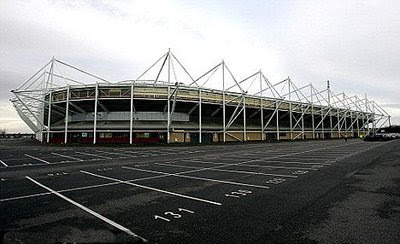
Liverpool and Darlington were important towns in the development of railways. Darlington was one end of the Stockton & Darlington Railway and Liverpool the origin of the Liverpool & Manchester Railway that started the great boom in railway construction around the world. But I have been thinking about other parallels between these two great northern towns. Yes, I know the much bigger Liverpool is a city. But the last few days have been very interesting one way and another. Liverpool? Yes, Liverpool. A story of success and sub-prime lending. I talk, of course, about the football team. Liverpool F.C. had a fairly successful season and were, perhaps, slightly unlucky not to have achieved more. Still they did come second in the Premier League and played in the Champions League. The club made £10m profit out of playing football - which may not seem brilliant but in the world of Football Finance, it is pretty good. It is typical of what Liverpool are able to do. But and it is a very big BUT, the off-shore parent company Kop Football [Holdings] Ltd. lost £42m. The primary reason for this was the interest payments on the money borrowed in order for Tom Hicks and George Gillett to buy the club in 2007. To buy the club they needed £185m. This was re-paid by setting up a new loan facility for £350m, using the club as collateral. This loan will have to be re-agreed with Royal Bank of Scotland, those paragons of financial virtue, before the end of next month. In addition to paying off their original loan the owners have spent over £120m and they have not yet started on the new stadium, which will be needed, they tell us, within four years. That stadium will cost about £400m. Errrr, how are they going to pay for that? I think I have understood the numbers and, if I have, then I feel the club is, as near as dam it, bust! Of course it will carry on but in a state of steady decline unless the club is sold to a very rich buyer. Football clubs do not really make money. Sure one or two seem to but even the most profitable football club in the world, Manchester United, is struggling with the burden of new debts. Liverpool's old stadium, Anfield, will hold 45,000 people. The club needs a new modern stadium that will hold 75,000. And someone has to pay for it. It will certainly not be Hicks & Gillett.
Stadiums are one of the reasons why it is so nearly impossible to make money from football. These playing areas take up a lot of space - usually prime land in cities - and a new facility costs up to £700m. But having made this enormous investment the facility does absolutely nothing for over 90% of the time. Here, I am being generous; this implies that the stadium would be in use for over 16 hours per week. In many cases it is much less. Somehow, a club has to create enough revenue from this facility to pay off debts and make a profit. And I have ignored the costs of players, etc.
A year or two back, in my professional capacity as an engineer, I attended a meeting set up by a chemical engineering contractor in a suite in the stadium of Darlington F.C., the Darlington Arena. I have to say that I was impressed. How did it pay for itself I wondered? The answer is that it didn't. The stadium cost about £30m when it was built in 2002. Various owners have tried to keep the club going but Darlington FC has tottered on the edge of collapse for years. The prime cause is this ridiculous stadium. It will hold 27,000 people - although local authority restrictions only allow more than 10,000 with special permission. But this is academic. Darlington F.C. are successful in playing football and the team was 2nd in the Championship Div 2 until they went into administration [again] in February owing £5m and were docked 10 points - quite why the players have to be penalised for the sins of the financiers, is not entirely clear to me. The trouble is that in spite of attempts to attract other users the Darlington Arena is used mainly for football matches a couple of times per week and average gates are about 3,000. Adult ticket prices are £18.00. The club's web site advises that buying tickets in advance will give a discount of 10% and will avoid match day queues. I think this is yet another triumph of hope over experience. Assuming the stadium has at least 20 entrances the crowds surging into the ground will only amount to 150 people per match per gate.- not, I would have thought, a recipe for queues of any kind. Watching Darlington play football can be a lonely experience in a ground that will hold 27,000 people. It does mean that total income from a match is about £50,000 - or less. Hardly a viable business plan. But all football is fantasy economics. Last month the club was "sold" to new owners and they may now again start to pay the players and staff.
Clearly Liverpool is a different kettle of fish to Darlington. But mainly, because they just have bigger numbers. The end result is the same. They owe more money to more people. Financing football clubs is serious sub-prime lending.





No comments:
Post a Comment